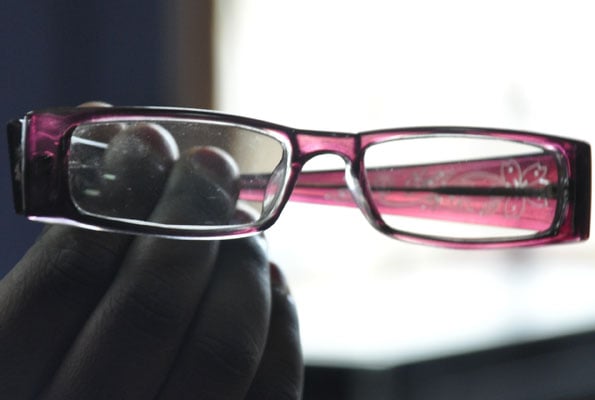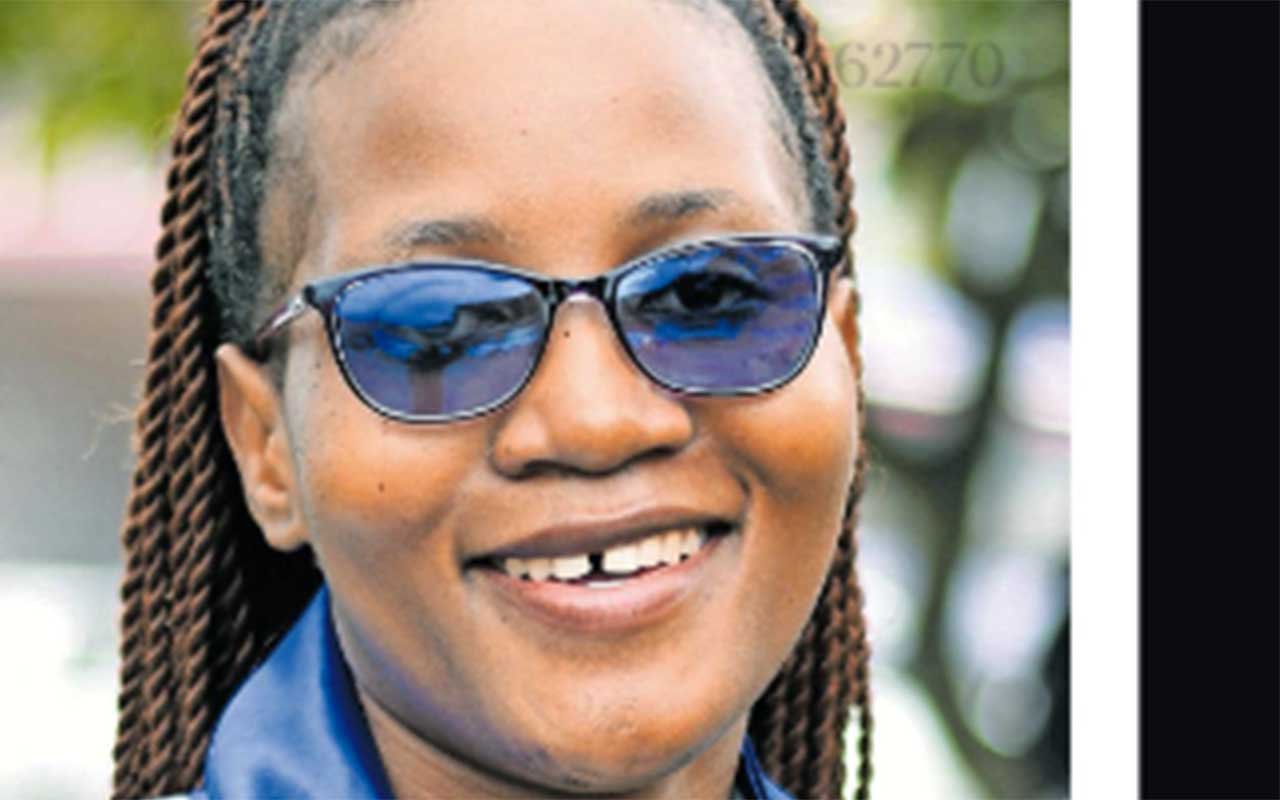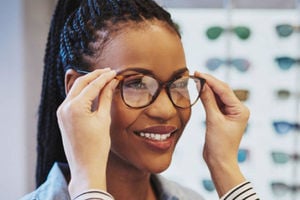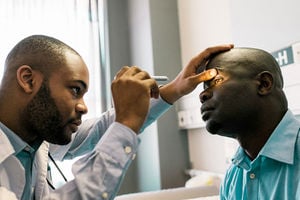
Make sure you get a professional to prescribe for you what kind of lenses you need. PHOTO/FILE/RACHEL MABALA
Jackline Salam Nairuba's right eye suffered from cataract; a cloudy area in the lens of the eye when she was just two months old. By the time her relatives sensed danger, doctors told them it was too late.
"My left eye can see slightly because the disease had just started affecting it," says Nairuba, who is pursuing a Bachelor of Arts in Education at Makerere University in Kampala.
But she only uses braille, a reading and writing system for blind and vision-impaired people, which works through touch. She learnt braille in a special needs primary school in Mukono District, after repeating classes and dropping out of conventional schools in Kamuli, rural Busoga.
"I did not know my sight was abnormal until one teacher realised my problem," she adds.
According to the World Health Organization, at least 2.2 billion people have vision impairment. Nairuba belongs to the one billion people whose impairment could have been prevented or is yet to be addressed.
Who is more vulnerable?
Elizabeth Amuge, an optometrist at Makerere University Hospital, aligns with research indicating that women, particularly in low-income countries, are more likely to experience vision problems due to socioeconomic factors. She also notes that women are biologically more vulnerable to conditions such as glaucoma and cataracts, which are among the primary causes of vision loss.
While the elderly are more prone to cataracts and presbyopia (the inability to focus on nearby objects), Amuge emphasises the need to pay special attention to children as they often do not report sight defects. If these defects are not corrected in time, the consequences may be irreversible.
She also warns against the dangerous belief that a child is too young to wear eyeglasses, stating that even a nine-month-old baby should wear eyeglasses if necessary.
Amuge highlights that while a 50-year-old can fully regain their vision after cataract surgery with the help of eyeglasses, a seven-year-old child may not be as fortunate due to potential brain development compromise from cataracts suffered at birth. Therefore, early detection and correction are vital.
Case for eyeglasses
Eyeglasses are the commonest method for correcting vision impairment, apart from surgery. Their effect on your eyesight is akin to that of a prosthetic limb for an amputee. While light is essential for vision, it must be properly managed. When light enters the eye, the cornea and lens adjust its path so that it converges at the retina at the appropriate distance, ensuring clear and sharp vision.
However, if you have a refractive error in one or both eyes, the affected eye cannot bend light correctly, resulting in blurry and out-of-focus vision. This is when eyeglasses come into play, compensating for what your eyes cannot do on their own. It is crucial to have a comprehensive examination to ensure you are wearing the correct glasses for your vision needs. Affordability and available options are also key factors to consider.
Felix Manyindo struggled with nearsightedness or myopia for years. He experienced blurry vision of distant objects until he purchased his first frame and lenses in 2008 for Shs250,000, despite needing them since 2002.
Sheila Kemigisha faced similar challenges, waiting until 2015 to get her first pair of glasses, despite needing them since Primary Four. She experienced dry eyes and discomfort from normal light, relying on eye drops until she became a newspaper editor.
Comfort matters
“Eyeglasses are not just about functionality,” Kemigisha says. Comfort is also crucial. She emphasizes the importance of well-fitting eyeglasses, recounting her experience of returning a loose pair that frequently slipped off when she leaned forward.
For her, comfort is key, and she does not mind searching through multiple shops to find the perfect frame. She believes that wearing eyeglasses should not compromise one's appearance, stating, "Can you imagine waking up every day and you are wearing something that makes you look ugly?"
When it comes to affordability, Amuge says the cost of eyeglasses depends on one’s condition and the place of purchase. She adds that a university hospital sells eyeglasses at a much lower price compared to private stores in city malls due to various factors. Kemigisha, for instance, says the lowest amount she has spent on a pair of eyeglasses is Shs700,000. She views eyeglasses as essential as medicine and does not compromise on quality.
Additionally, Kemigisha shares an incident where she lost her eyeglasses at a grocery store and had to drive back to Kampala to purchase a new pair before continuing her journey upcountry. Since then, she has made it a habit to carry two pairs.
Manyindo, on the other hand, has used only two frames in 16 years. His latest frame is valued at Shs140,000. However, he finds the cost of changing lenses every two years, which ranges from Shs180,000 to Shs240,000, expensive, despite having insurance coverage. He acknowledges that many Ugandans are not as fortunate to have such coverage.
Dignity of choice
Some eyeglasses serve multiple functions, and various factors determine their prices. However, in an economy where 50 percent of the population are teenagers and, therefore, dependents, and the average monthly income is $82 (Shs300,000) per person, many people with vision problems may have to settle for less or nothing due to a lack of choice.
This is why organizations such as VisionSpring are providing hope for choice to Ugandans. With branches in Nigeria, Ghana, and Uganda, the organisation supports eye care providers to offer affordable eyeglasses to low-income earners and hard-to-reach communities such as Karamoja sub-region in northern Uganda.
Juliet Busobozi, the programmes manager at Sightsavers, an international charity working to prevent avoidable blindness, states that since 2017, VisionSpring has been supplying eyeglasses to Sightsavers for free distribution in Karamoja. Busobozi emphasises that this partnership has been crucial in addressing refractive errors in the region.
Regular checkup
Amuge recommends that children receive vision screening at least once between the ages of three and five to detect conditions such as amblyopia, a type of poor vision that typically affects one eye, but can also affect both eyes, although less commonly. When using eyeglasses, Amuge suggests getting a checkup at least once a year.
Durability, flexibility
Manyindo prefers plastic eyeglass frames because they are less likely to break, and also because he is allergic to some metals. Nowadays, his eyeglasses have an antiglare effect for easier night driving and tint for protection from the sun. When Kemigisha had difficulty reading, she got progressive lenses, which have helped her with close-up reading, distance viewing, and driving all in one pair.
Misconceptions
Eyeglasses have been clinically proven to have minimal or no side effects. Normally, it takes some time to adjust to new ones. Wearing glasses does not make you blind. Instead, not using them when you need to is the problem. Elizabeth Amuge, an optometrist, says inconsistent use of glasses might compromise the therapy if they are supposed to correct muscle imbalance.
For instance, if you are shortsighted and avoid wearing glasses while driving, you risk accidents. If you feel that before using eyeglasses you could see, but now without them, you cannot, do not blame the glasses. She emphasises that before, your brain was used to seeing poorly, but now, after getting used to better vision, it is telling you ‘Please keep the glasses on.’



